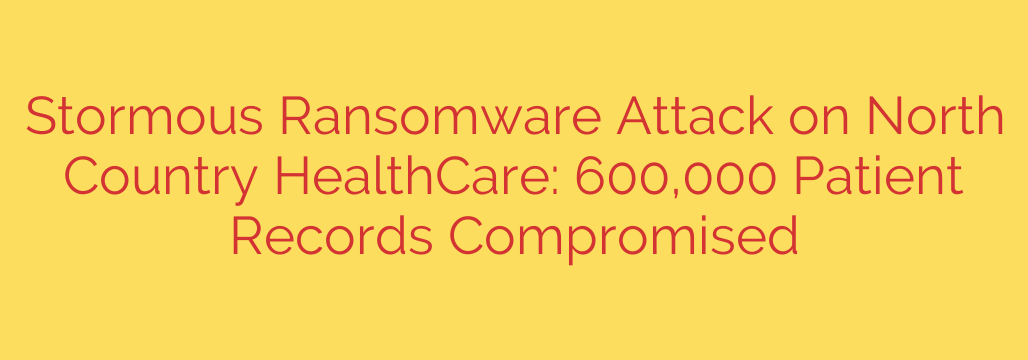
Major Healthcare Data Breach: North Country HealthCare Hit by Stormous Ransomware, 600,000 Patients Affected
A significant cybersecurity incident has struck North Country HealthCare (NCHC), a vital healthcare provider based in Arizona. The organization has fallen victim to a sophisticated attack by the Stormous ransomware group, resulting in a massive data breach that has compromised the personal information of an estimated 600,000 individuals. This attack underscores the escalating cyber threats targeting the healthcare sector, where sensitive patient data is a high-value target for criminals.
The breach, which was carried out in October, has exposed a vast amount of protected health information (PHI), leaving hundreds of thousands of patients vulnerable to fraud and identity theft.
The Scope of the Breach: What Was Compromised?
Ransomware attacks are no longer just about locking down systems; they are about data theft. In this incident, the attackers exfiltrated, or stole, a massive trove of data before encrypting NCHC’s network. The compromised information is extensive and highly sensitive.
According to reports, the stolen data includes:
- Patient names and dates of birth
- Social Security numbers
- Health insurance information
- Medical record numbers and patient account numbers
- Clinical information, including diagnoses and treatments
The theft of such comprehensive data sets creates a perfect storm for malicious activity. Cybercriminals can use this information to commit medical identity theft, file fraudulent insurance claims, open new lines of credit, or sell the data on the dark web to the highest bidder.
Who is the Stormous Ransomware Group?
The Stormous group is a known entity in the world of cybercrime. They operate a Ransomware-as-a-Service (RaaS) model, creating malicious software and leasing it to other criminals in exchange for a share of the profits. This group has a history of targeting various industries, but the attack on North Country HealthCare highlights their willingness to disrupt critical infrastructure.
Their typical method involves gaining unauthorized access to a network, quietly stealing large volumes of valuable data, and then deploying ransomware to encrypt the victim’s files. By holding both the data and the systems hostage, they apply immense pressure on organizations to pay a ransom.
The Growing Threat to Healthcare Cybersecurity
The healthcare industry remains a prime target for cyberattacks for several key reasons:
- Valuable Data: Protected Health Information (PHI) is worth more than credit card numbers on the dark web because it is permanent and can be used for a wider range of fraudulent activities.
- Critical Operations: Hospitals and healthcare providers cannot afford significant downtime, making them more likely to pay a ransom to restore their systems and resume patient care quickly.
- Vulnerable Systems: Many healthcare organizations operate with a complex mix of new and legacy IT systems, which can create security gaps that attackers exploit.
This incident at North Country HealthCare is a stark reminder that robust cybersecurity measures are not optional—they are an essential component of patient safety and trust.
Actionable Steps for Affected Patients and How to Protect Yourself
If you believe you may have been affected by this data breach, or if you want to proactively protect yourself against similar threats, it is crucial to take immediate action.
- Monitor Your Financial and Medical Statements: Carefully review your bank statements, credit card bills, and Explanation of Benefits (EOB) from your health insurer. Look for any services, charges, or claims you do not recognize.
- Consider a Credit Freeze: A credit freeze is one of the most effective ways to prevent identity thieves from opening new accounts in your name. Contact the three major credit bureaus (Equifax, Experian, and TransUnion) to place a freeze on your credit files. It is free and can be lifted when you need to apply for new credit.
- Be Vigilant Against Phishing: Cybercriminals will use the stolen information to craft highly convincing phishing emails, text messages, or phone calls. Be skeptical of any unsolicited communication that asks for personal information, and never click on suspicious links or attachments.
- Secure Your Online Accounts: Use strong, unique passwords for all your online accounts, especially for patient portals, email, and financial institutions. Enable two-factor authentication (2FA) wherever possible for an extra layer of security.
- Seek Official Communication: Watch for official notifications from North Country HealthCare regarding the breach. They are legally required to notify affected individuals and may offer credit monitoring services.
This breach is a serious development with long-lasting implications for the 600,000 patients involved. It reinforces the critical need for individuals to remain vigilant and for all organizations, especially those in healthcare, to invest heavily in defending against the persistent and evolving threat of cybercrime.
Source: https://securityaffairs.com/180057/data-breach/180057stormous-ransomware-gang-targets-north-country-healthcare-claims-600k-patient-data-stolen.html








